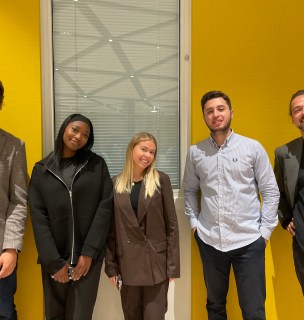Why choose the MSc Manager of Sustainable Development & Ecological Transition course?
This program is aimed at learners wishing to acquire strategic, managerial, financial, commercial and entrepreneurial skills in line with sustainable development and ecological transition. The program meets the need for versatility and global decision-making when a company is undergoing development or transition. The program aims to prepare the future managers on whom companies will rely to develop their culture, better understand the needs of consumers and employees, and develop their capacity for innovation through sustainable development.
Training objectives
The objectives in terms of skills are to be able to :
- Design and define the strategic orientations of the company/organization;
- Steering financial strategy ;
- Manage marketing and sales strategy;
- Managing teams ;
- Steering the company’s CSR strategy.

A 1 or 2-year diploma to become a sustainable development expert
- Hours1st year of MSc: 441 hours
- Hours in2nd year of MSc: 441 hours
How to apply for the MSc Manager of Sustainable Development & Ecological Transition?
Prerequisites
The conditions for access to the certification system (excluding VAE) are :
- For entry into the1st year of the program (MSc 1): Validate a level 6 or equivalent (Bachelor’s degree) in one of the following fields: management sciences, economics or foreign languages applied to economics, marketing and commerce.
- For entry into the2nd year of the program (MSc 2): To have validated a level 6 or equivalent (Master 1 type) in one of the following fields: management sciences, economics or management.
The school remains open to other types of training as long as the candidate’s career plan is consistent with his or her aspirations.
Would you like to find out more about the MSc Manager of Sustainable Development & Ecological Transition program? Meet us at the next information meeting!
Would you like to find out more about our admissions process?
What courses does the MSc Manager of Sustainable Development & Ecological Transition offer?
The courses presented below are given as examples, and may vary slightly depending on the teaching campus. Course content is adapted to market trends each year and updated before the start of the new academic year.
1st year courses
CROSS-DISCIPLINARY & FUNDAMENTAL COURSES –1ST YEAR
PROFESSIONAL TOOLS & METHODS
This module enables learners to improve their CVs and posture through role-playing exercises (business game, professional simulation, public speaking, etc.); practical and professionalizing workshops (CVs, professional social networks, coaching, etc.) as well as professional conferences and master classes.
CORPORATE STRATEGY & BUSINESS PLAN
This module develops the concepts and practice of business strategy. The elements of a business plan are covered, enabling you to project yourself in the creation of a new company.
SOFTWARE & DECISION SUPPORT TOOLS
The aim of this module is to enhance learners’ IT skills to meet the needs of companies in terms of budgeting, sales, project management, personnel management and communication: Excel, Word, Powerpoint, teamwork tools, business software. The aim is to get the most out of office automation tools, quickly identify and correct errors, customize existing tools or create your own.
BUDGET MANAGEMENT & DASHBOARDS
The aim is to acquire key skills in budget management and reporting. Particular emphasis will be placed on budget architecture, with the implementation of summary documents, project management control and its link with budget management, and the creation and management of dashboards.
NEGOTIATION APPLIED TO HR
- This module aims to develop the negotiation skills essential for HR professionals, whether managing relations with social partners, conducting recruitment interviews or resolving internal conflicts.
- Participants will learn negotiation techniques, communication strategies and influencing tools to reach mutually beneficial agreements.
- The aim is to train experts capable of defending the company’s interests while taking human and social issues into account.
SPECIALIZED COURSES
DATA STRUCTURING & GENAI
- Learn the fundamentals of data manipulation and generative artificial intelligence.
- Explore the power of Google Sheets to organize, analyze and visualize data, while integrating no-code tools to automate processes.
- Particular attention is paid to prompt engineering, to create effective interactions with AI systems.
- This course is aimed at both beginners and those wishing to deepen their skills, providing them with the tools they need to optimize their workflow with AI.
INTRODUCTION TO CSR
- This course is fundamentally action-oriented.
- It provides an overview of the fundamentals of CSR, the major global challenges and the opportunities it offers companies.
- It shows why having a CSR approach is an opportunity for a company, how to act methodically to support your company in a robust CSR approach, and proposes multiple CSR action paths for all your company’s activities.
SUSTAINABLE DEVELOPMENT & GREEN MANAGEMENT
- This course will help you understand the issues at stake in the major transition we’re going through, and discover how sustainable development, and more specifically CSR, constitute a new model of economic development that meets today’s challenges.
- This paradigm, based on strong values and principles, offers an alternative to “traditional” business models.
COMMUNICATION & SUSTAINABLE DEVELOPMENT
- The challenges of sustainable communication in a context where companies must account for their social and environmental impacts.
- Students will learn how to develop effective communication strategies to reach all stakeholders: employees, customers, investors, etc.
- They will acquire the tools they need to build a responsible brand image and strengthen trust with their audiences.
MANAGEMENT & LEADERSHIP
- Train professionals capable of leading and managing teams and organizations.
- Acquire the skills and knowledge to lead and manage men and women.
- Develop leadership qualities such as vision, motivation and communication.
- Adapt to changes in the world of work.
HISTORY & GEOPOLITICS OF SUSTAINABLE DEVELOPMENT
- Take a step back in time and discover the historical milestones that led to the emergence of the concept of sustainable development, from the first environmental reflections to the Rio Conference in 1992.
- Identify the different players involved in promoting sustainable development, such as governments, international organizations, businesses and civil society.
SOCIAL POLICY & INNOVATION
- Manage human resources effectively and acquire a strategic and operational vision of the HR function.
- Understand the role and missions of the HR department in leading and supporting corporate change.
- Definition of HRM.
- HRM and other corporate functions.
- The strategic dimension of HRM.
- Corporate performance and HRM.
- The structure of the HRM function.
- HR jobs.
- Innovation in HRM.
WORK & ORGANIZATIONAL PSYCHOLOGY
- Factors that influence the success of a work team.
- Adapting to change and professional development: psychological brakes and drivers.
- Managing stress at work and burn-out.
- The effects of information and communication technologies on work and organization.
INTRODUCTION TO CHANGE MANAGEMENT
- Introduce learners to the fundamentals of change management.
- They will learn to identify the key success factors for organizational transformation, implement support strategies and manage resistance to change.
- This course will give them the tools they need to effectively manage transformation projects within a company.
LABELS & CSR QUALITY IN COMPANIES
- This module explores the various existing CSR labels and certifications.
- Evaluate the relevance of these tools for their company and set up a certification process.
- They will also discover the concept of the impact company and the steps to take to measure and improve its social and environmental impact.
CSR CHALLENGES
- This fundamental module introduces students to the key concepts of Corporate Social Responsibility (CSR).
- They will discover the economic, social and environmental challenges facing companies today, as well as best practices for integrating CSR at the heart of their strategy.
- The module will enable them to develop an in-depth understanding of the challenges and opportunities associated with the ecological transition.
CLIMATE FRESCO & NEW NARRATIVES
- Learners will enjoy an immersive experience thanks to the Climate Fresco, and will acquire the skills they need to become workshop leaders themselves, in order to raise awareness of climate issues among their peers.
- La Fresque des Nouveaux Récits is a collaborative workshop that aims to create positive and inspiring narratives for the future.
- By playing with cards, participants identify the obstacles to action and co-construct alternative visions for a desirable, sustainable future.
SOCIALLY RESPONSIBLE INVESTMENT & GREEN FINANCE
- This course explores all the players in green finance and the challenges they face.
- Combining a theoretical and practical approach, it will enable you to develop an in-depth understanding of the issues involved in the energy and environmental transition.
- This will enable you to identify the opportunities and risks associated with green finance.
INTERNAL COMMUNICATION
- The company in its relationship with people.
- Internal communication as a management tool.
- The company project.
- Corporate culture and rituals.
- Internal communication objectives and available tools.
- Development of an internal communications plan.
- Local management, reporting lines and communication implications.
EXAMS & SUPPORT
WRITTEN EXAMS
2nd year courses
CORPORATE STRATEGY
SUSTAINABLE DEVELOPMENT & CSR STRATEGY & CHALLENGES
- This module enables learners to master key definitions and understand the environmental, social and economic challenges facing business and society.
- They will be able to analyze the context, identify stakeholders, assess impacts and define a coherent and effective CSR strategy.
INNOVATION & SUSTAINABLE DEVELOPMENT
- Explore the challenges posed by resource depletion, climate change and social inequalities, and identify opportunities for innovation in response.
- This module enables you to master the methodologies and tools specific to sustainable innovation, such as design thinking, life cycle analysis and the circular economy.
PROFESSIONAL TOOLS & METHODS
This module enables learners to improve their CVs and posture through role-playing exercises (business game, professional simulation, public speaking, etc.); practical and professionalizing workshops (CVs, professional social networks, coaching, etc.) as well as professional conferences and master classes.
CIRCULAR ECONOMY & TECH FOR GOOD
- This module enables learners to master key concepts such as the product life cycle, resource recovery and the creation of shared value for a sustainable economy.
- They will learn about the different strategies and circular business models implemented by companies, from design thinking to the functionality economy.
ENVIRONMENTAL ISSUES & GOVERNANCE
- Understand environmental issues and their impact on businesses.
- Implement effective environmental governance within their organization.
- Develop and implement an ambitious CSR strategy that creates value.
- Contribute to the transition of companies towards a more sustainable and responsible development model.
STEERING FINANCIAL STRATEGY
TOOLS & INDICATORS FOR SUSTAINABLE DEVELOPMENT, CSR & TRANSITION
This module provides the necessary toolbox for the ecological transition manager to support the company or organization. Whether based on existing benchmarks or developing your own indicators, the creation or improvement of a CSR report will be covered.
SUSTAINABLE FINANCE & RESPONSIBLE INVESTMENT
- Understanding the different practices of sustainable finance is an essential lever for meeting CSR challenges.
- Sustainable finance takes extra-financial criteria into account, in addition to financial criteria, in the analysis, selection and management of investments.
DD RIGHTS, REGULATIONS & STANDARDS
- The seven generic principles of CSR will be addressed: accountability, transparency, ethical behavior, respect for stakeholder interests, respect for the principle of secularity, compliance with international standards of behavior and respect for human rights.
- ISO 26000, an international standard, incorporates all seven of the above criteria and will therefore be studied in particular.
SUSTAINABLE DEVELOPMENT & CSR AUDIT
- Project management applied to sustainable development and CSR audits will be put into practice.
- The methodological approach, the main indicators and the evidence to be provided will therefore be discussed.
MARKETING & SALES MANAGEMENT
COMMUNICATION & SUSTAINABLE DEVELOPMENT
- How can communications be integrated into a global approach to sustainable development?
- To answer this question, three aspects will be developed.
- 1) Internal communication: initiatives to involve employees. The different levers: awareness-raising, training, mobilization, integration into the management system: “inspiring” methods and practices.
- 2) External communication: how to speak to a wider audience than just experts? Study the risks and opportunities of communication. Develop messages and know how to choose and use the different vectors.
- 3) Product and service communication: recognizing consumer needs and expectations. Implement sustainable and responsible means of communication.
- We’ll also look at the role of NGOs, associations and philanthropy: a sector with little visibility but growing influence.
ECO-DESIGN & MARKETING
- Reduce, Reuse, Recycle: the 3Rs will be developed and put into practice in product design and marketing.
- As well as riding a consumer trend, the learner will be immersed in eco-design as a factor in the company’s sustainable development.
SUPPLY CHAIN MANAGEMENT DURABLE
- The corporate purchasing function and major purchasing strategies;
- Sourcing, production management ;
- Logistics and supply chain management will be studied from a sustainable perspective.
- Best practices will be discussed and areas for improvement developed.
ENERGY TRANSFORMATION & ECO-INNOVATION
- This module covers energy transformation and eco-design. This may involve renewable energies:
- Solar, wind, biomass, etc. and their implementation or improvement.
TEAM MANAGEMENT
MANAGEMENT & CHANGE MANAGEMENT APPLIED TO CSR AND SD
- Building and sharing a vision, giving meaning to actions, initiating change and developing processes, defining clear objectives and empowering people: these are the roles of the leader and manager at the heart of change management.
- This module enables you to adopt the posture and discourse that will lead to positive change and the support of the greatest number of people.
HR MANAGEMENT, INCLUSION & CSR
- As a transition manager or future manager :
- Implementing a transition and inclusion strategy within companies to improve operational and employee skills, while taking into account the societal dimension, is the challenge that will be taken up through this module.
QHSE & QSE MANAGEMENT
- Mastering the Quality, Health, Safety and Environment (QHSE) policy, while respecting company production standards, employees’ working environment, equipment and the environment are the main elements covered in this module.
CSR MANAGEMENT
SUSTAINABLE TERRITORIES & SMART CITIES
- This module introduces the latest concepts in urban and sustainable development, using the latest technologies to improve the quality of urban services for all stakeholders.
ENERGY TRANSFORMATION & ECO-INNOVATION
- This module covers energy transformation and eco-design.
- This may involve renewable energies: solar, wind, biomass, etc., and their installation or improvement.
BUSINESS ETHICS
- Analyzing the rules and principles of business ethics, and understanding its core values based on respect for people, fairness and responsibility, is the aim of this module.
APPLIED RESEARCH PAPER
- Analyzing the rules and principles of business ethics, and understanding its core values based on respect for people, fairness and responsibility, is the aim of this module.
EXAMS & SUPPORT
EXAMINATIONS
- Written exams.
- Dissertation defense.
Two start dates per year: February/March or September/October, and several study rhythms
There are two re-entries per year,in February/March and September/October.To check the opening of each intake, contact the admissions department directly.
The pace of courses can vary from campus to campus, and depending on whether the course is taken under an internship agreement (initial) or a professionalization/apprenticeship contract (continuing).
The work-study contract must be signed for a period of 12 months (MSc 2) or 24 months (MSc1 + MSc 2).
To find out the length of the staggered start contract, contact the admissions department of the campus you are interested in.

What career opportunities are there after an MSc in Sustainable Development?
Holders of the “Manager des Entreprises et des Organisations” certification perform their duties in all business sectors. Holders of the certification are likely to work in both SMEs and multinationals, in France and abroad.
- Director/Manager/Company manager
- General Manager
- Executive Vice President
- Business unit/subsidiary manager
- Branch Manager/Branch Manager
- Contractor
- Organization/corporate strategy consultant
- Corporate CSR Manager
Find out more on our Management and CSR career opportunities page.
What are the business skills developed for this MSc in Ecological Transition?
The professional certification allows you to prepare for the following blocks of skills:
- Design and implement strategic orientations for the company/organization.
- Managing the company’s financial and non-financial strategy
- Manage marketing and sales strategy
- Managing teams and driving organizational change
In addition to these common skill blocks, there is an optional sector block:
- Steering the company’s CSR strategy.
Description of how to acquire certification by capitalizing on blocks of skills and/or by correspondence
- Validation of four blocks of skills common to all courses, plus a block of specialization depending on the candidate’s course (each block of skills must be passed with a mark of 10/20 or higher).
- A minimum 132-day work placement during the second year of the program (MSc 2).
Professional certification
Professional certification as a ” Manager of Companies and Organizations “, NSF code 310, awarded by INSEEC MSc (CEE-SO, CEE-RA, CEFAS, MBA INSTITUTE, ADEFI FORMATION, CEE-M, CEE-OUEST), registered under number 40353 in the RNCP (Répertoire National des Certifications Professionnelles) by decision of the Director General of France Compétences on April 21, 2025.
Certification is awarded by capitalizing on all the skill blocks. Each skill in a block must be confirmed to obtain the block of skills. Partial validation of a block is not possible. It is also accessible via the Validation of Acquired Experience (Validation des Acquis de l’Expérience).
For further details, please consult the online reference guide: https://www.francecompetences.fr/recherche/rncp/40353
What are the teaching methods?
Teaching methods
- Lectures and interactive courses
- Role-playing through group and/or individual case studies carried out by students
- Educational conferences, seminars and tours
Assessment methods
- Individual and/or group case studies
- Individual and/or group oral presentations
- Individual and/or group files
- Applied research dissertation with individual defense
Methods and tools
- Assessment is carried out face-to-face, in the form of continuous assessment or final exams in the form of mid-term exams.
What are the tuition fees for 2025/2026?
SEPTEMBER/OCTOBER 2025
Initial training:
- Entry to MSc1: €10,990
- Direct entry to MSc2: €12,950
Continuing education (sandwich courses):
- 24-month training: €23,400 excl.
- Direct entry to MSc2: €13,490 excluding VAT
International student pack
Mandatory additional fee of €700 on top of the tuition fees listed above for exclusive support services for international students from outside the European Union.
BACK TO SCHOOL FEBRUARY/MARCH 2026
Initial training:
- Entry to MSc1: €10,990
- Direct entry to MSc2: €12,950
Continuing education (sandwich courses):
- 24-month training: €23,400 excl.
- Direct entry to MSc2: €13,490 excluding VAT
International student pack
Mandatory additional fee of €700 on top of the tuition fees listed above for exclusive support services for international students from outside the European Union.
In the case of work-study training, tuition fees are payable by the OPCO and the company signing the contract.
VAE/VAP
- VAE : 4 800 € HT
- VAP: €850 EXCL.
International student pack
Compulsory contribution in addition to the tuition fees indicated above for exclusive support services for international students from outside the European Union.
- September/October 2025: Mandatory membership fee of €700
- February / March 2026: Mandatory membership fee of €700
Application fees
The application fee is €80.
How can I finance my studies in sustainable development?
INSEEC offers a number of financial aid schemes:
- Alternating work -study or work-study contracts.
- The right to training via the CPF.
- Partnerships with banking institutions referenced at INSEEC.
key figures for RNCP n°36493 "Manager of companies and organizations".
95%
National success rate
Class of 2024
100%
Presentation rate
Class of 2024
96%
Overall integration rate (364 respondents out of 519)
– Class of 2023
89%
Satisfaction rate at 6 months (364 respondents out of 519)
Class of 2023
* Details are available in this document (national results and by regional certifier).
What is our school’s disability policy?
The OMNES Education Group pays particular attention to the societal environment, which includes the disability dimension. We believe that students with disabilities should have no problems pursuing their studies or starting a professional career. We support them by facilitating access to our facilities, offering personalized advice and making appropriate adjustments throughout their academic career.
Accessible premises: all our campuses are accessible to people with disabilities.
To find out more about OMNES Education’s disability policy, click here.
Contacts for disability representatives on each campus :
- Bordeaux: Maxime DOUENS – mdouens@inseec.com
- Lyon: Anissa GASMI – agasmi@inseec.com
- Rennes: Laura LE CALVEZ – llecalvez@omneseducation.com
- Paris : Farid HAMAD-fhamad@inseec.com
- Chambéry: Clément BERTACCO – cbertacco@inseec.com
- Marseille: Océane VALOTTI – ovalotti@omneseducation.com
- Toulouse: Amanda MARNEIX – amarneix@omneseducation.com







